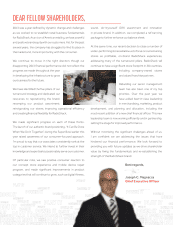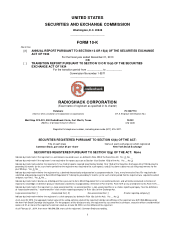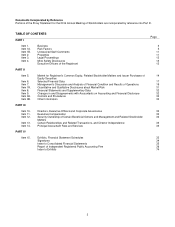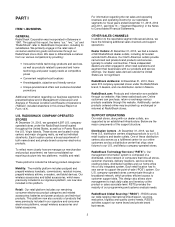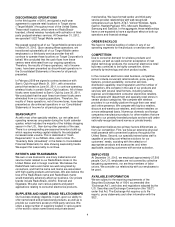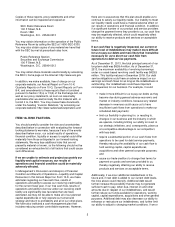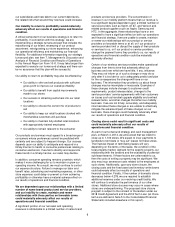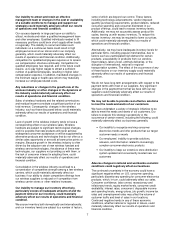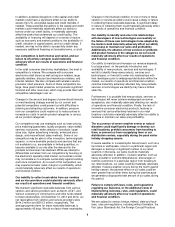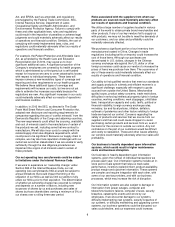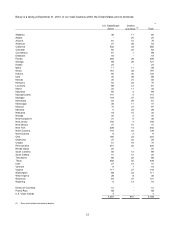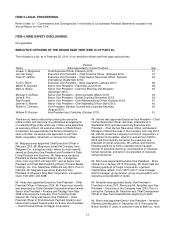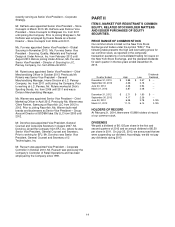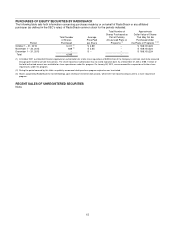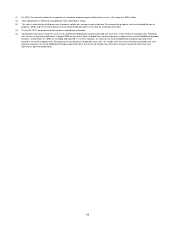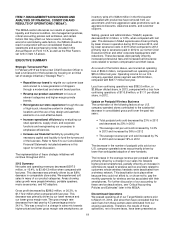Radio Shack 2013 Annual Report Download - page 11
Download and view the complete annual report
Please find page 11 of the 2013 Radio Shack annual report below. You can navigate through the pages in the report by either clicking on the pages listed below, or by using the keyword search tool below to find specific information within the annual report.9
Act, and ERISA, each as amended, and regulations
promulgated by the Federal Trade Commission, SEC,
Internal Revenue Service, Department of Labor,
Occupational Safety and Health Administration, and
Environmental Protection Agency. Failure to comply with
these and other applicable laws, rules and regulations
could result in the imposition of penalties or adverse legal
judgments and could materially adversely affect our results
of operations and financial condition. Similarly, the cost of
complying with newly-implemented laws, rules, and
regulations could materially adversely affect our results of
operations and financial condition.
For example, the Patient Protection and Affordable Care
Act, as amended by the Health Care and Education
Reconciliation Act of 2010, may cause us to incur
significant additional costs. A significant proportion of the
Company’s employees are covered by its health program,
which is administered by a third party but is self-funded
except for insurance we carry to cover catastrophic losses
with respect to individual employees. These laws will
impose numerous new mandatory types of coverage and
reporting and other requirements on our health program.
We believe these additional types of coverage and
requirements will increase our costs, but we are not yet
able to estimate the increases accurately because the
regulations are new. Any significant increases in our costs
could materially adversely affect our results of operations
and financial condition.
In addition, in 2012 the SEC, as directed in The Dodd-
Frank Wall Street Reform and Consumer Protection Act,
adopted new disclosure and reporting requirements for
companies regarding the use of “conflict minerals” from the
Democratic Republic of the Congo and adjoining countries.
The new requirements could affect the sourcing, availability
and cost of minerals used in the manufacture of certain of
the products we sell, including some that we contract to
manufacture. We will also incur costs to comply with the
related supply chain due diligence requirements, which
could prove to be significant. Because our supply chain is
complex, we may also face reputation challenges with our
customers and other stakeholders if we are unable to verify
sufficiently through the due diligence procedures we
implement the origins of all minerals used in certain of
these products.
Our net operating loss carryforwards could be subject
to limitations under the Internal Revenue Code.
If we were to experience an “ownership change” under
Section 382 of the Internal Revenue Code, our net
operating loss carryforwards (NOLs) would be subject to
annual limitations that could impact the timing of the
utilization of our NOLs as well as limit our ability to fully
utilize our NOLs prior to their expiration. The determination
of whether an ownership change has occurred is complex
and depends on a number of factors, including new
issuances of shares by us and purchases and sales of
shares by those shareholders owning a minimum of 5% of
our shares over a rolling three-year period.
Risks associated with the suppliers from whom our
products are sourced could materially adversely affect
our results of operations and financial condition.
We utilize a large number of suppliers located in various
parts of the world to obtain private brand merchandise and
other products. If any of our key vendors fail to supply us
with products, we may not be able to meet the demands of
our customers, and our sales and profitability could be
materially adversely affected.
We purchase a significant portion of our inventory from
manufacturers located in China. Changes in trade
regulations (including tariffs on imports) could increase the
cost of those items. Although our purchases are
denominated in U.S. dollars, changes in the Chinese
currency exchange rate against the U.S. dollar or other
foreign currencies could cause our vendors to increase the
prices of items we purchase from them. The occurrence of
any of these events could materially adversely affect our
results of operations and financial condition.
Our ability to find qualified vendors that meet our standards
and supply products in a timely and efficient manner is a
significant challenge, especially with respect to goods
sourced from outside the United States. Merchandise
quality issues, product safety concerns, trade restrictions,
difficulties in enforcing intellectual property rights in foreign
countries, working conditions, work stoppages, child labor
laws, transportation capacity and costs, tariffs, political or
financial instability, foreign currency exchange rates,
monetary, tax and fiscal policies, inflation, deflation,
outbreak of pandemics and other factors relating to foreign
trade are beyond our control. Concerns regarding the
safety of products and services that we source from our
suppliers and then sell could cause shoppers to avoid
purchasing certain products and services from us, even if
the basis for the concern is outside our control. Any lost
confidence on the part of our customers would be difficult
and costly to reestablish. These and other issues affecting
our vendors could materially adversely affect our sales and
profitability.
Our business is heavily dependent upon information
systems, which could result in higher maintenance
costs and business disruption.
Our business is heavily dependent upon information
systems, given the number of individual transactions we
process each year. Our information systems include an in-
store point-of-sale system that helps us track sales
performance, inventory replenishment, product availability,
product margin and customer information. These systems
are complex and require integration with each other, with
some of our service providers, and with our business
processes, which may increase the risk of disruption.
Our information systems are also subject to damage or
interruption from power outages, computer and
telecommunications failures, computer viruses, security
breaches, catastrophic events and errors by our
employees. If we encounter damage to our systems,
difficulty implementing new systems, security breaches of
our systems, or difficulty maintaining and upgrading current
systems, our business operations could be disrupted, our
sales could decline, and our expenses could increase.


